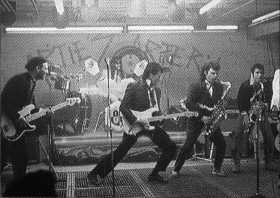Quote Gallery
Reproduced below are a few of my favorite quotes. Quotes are in
blue, my commentary is in red.
Most (though not all!) of the quotes here are witty and insightful.
So always bear in mind the words of caution:
engage brain before opening mouth.
General
 "When a man lies, he murders some part of the world."
"When a man lies, he murders some part of the world."
- Paul Gerhardt (17th century), repopularized by John Boorman and
Merlin in the movie Excalibur
I would extend this to ignoring facts.
"What gets us into trouble is not what we don't know.
It's what we know for sure that just aint so."
- Yogi Berra/Mark Twain (I've heard attributions to both)
This is a great one. Think it through.
"...when you have eliminated the impossible, whatever remains,
however improbable, must be the truth."
- Sherlock Holmes, in Sign of Four by Sir Arthur Conan Doyle
Yes, he really does say this, though it is usually taken
somewhat out of context. This phrase is embedded in a
longer diatribe directed at Watson's failure to see what Holmes considers
obvious.
"All we know so far is what doesn't work."
- Richard Feynman
And of course if you find something that does work,
people will say "surely you must be joking."
"When we think we know, we cease to learn."
- Dr. Radhakrishnan
All of us are guilty of this sometimes, some of us are
guilty of it all the time.
"Faced with the choice between changing one's mind and proving that there
is no need to do so, almost everybody gets busy on the proof."
J. K. Galbraith
Hence the persistence of such foolishness as Intelligent
Design and any number of ApJ papers trying to fudge data in favor
of NFW.
One is finally tempted to divide mankind into a minority (minimality) of those people who know how to make much out of little and a majority of those who know how to make a little out of much; indeed, one meets those perverse wizards who, instead of creating the world out of nothing, create nothing out of the world.
- Friedrich Nietzche
Though a general statement on human nature, this applies quite
well to cosmologists as a group, both past and present.
 "My heart was beating faster; I was moved, trembling and
fascinated in the face of such mastery and refinement of beauty."
"My heart was beating faster; I was moved, trembling and
fascinated in the face of such mastery and refinement of beauty."
- Itchiku Kubota
describing his reaction upon seeing an ancient piece of
Tsujigahana fabric.
I felt much the same when I saw his
magnificent kimono art.
"I've never observed wisdom to emerge from shouting."
- me, from long experience watching (and being involved in) heated
debates.
Astronomy Specific
"I'm sure it was a great honor for you to introduce me."
- Alan Sandage
A classic case of politeness gone ambiguous.
"You can lead a theorist to data, but you can't make him
think."
- me
"Obvious results provoke opposition.
The more obvious the result, the stronger the opposition."
- me
A few good ones from the 37th Herstmonceux Conference, Cambridge 1996:
"In the late 80's the RGO stood on the brink of a precipice. When
Alec Boksenberg took over, it took a great leap forward."
- George Efstathiou
It took a decade to hit bottom.
"Yes, I wrote papers on Cold Dark Matter, but I didn't inhale."
- John Peacock, to Carlos Frenk
Just like Clinton didn't inhale while smoking marijuana.
The Frenk Principle:
"If the Cold Dark Matter Model does not agree
with observations, there must be physical processes, no matter how bizarre
or unlikely, that can explain the discrepancy."
I have heard two versions of the Strong Frenk Principle:
1:
"The physical processes must be the most bizarre and unlikely..."
2:
"If we are incapable of
finding any physical processes to explain the discrepancy between
CDM models and observations, then observations are wrong."
- George Efstathiou
This pretty much sums up the state of modern cosmology.
Link
to similar quotes from a Princeton cosmology meeting of the same era.
Galaxy Dynamics Conference, Rutgers 1998:
I was obliged to introduce a new principle myself:
The Spergel Principle:
"It is better to postdict than to predict."

Cosmology Solved: the Nature of the Universe Debate, Smithsonian 1998
Discoveries made in 1998 may ultimately have as profound
an effect on our understanding of the origin and evolution of the
universe [as did the discovery of the cosmic microwave background
in 1964].
- Michael Turner (1999 PASP, 111, 264)
I agree with this statement. But which discoveries?
 "My heart was beating faster; I was moved, trembling and
fascinated in the face of such mastery and refinement of beauty."
"My heart was beating faster; I was moved, trembling and
fascinated in the face of such mastery and refinement of beauty." "When a man lies, he murders some part of the world."
"When a man lies, he murders some part of the world."